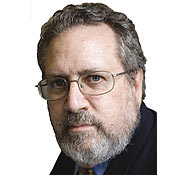
Should the government be able to detain a possibly dangerous American indefinitely without a trial? New York lawyer Andrew Patel doesn’t think so. But on September 9, a federal appeals court in Virginia ruled that the U.S. was justified in doing that to Patel’s client, Jose Padilla, who was apprehended at O’Hare airport in 2002 amid allegations that he was plotting to set off a “dirty bomb.” Patel—who’s said he may be the first attorney to ask for his client to “be indicted by a federal grand jury”—spoke with Joel Whitney.
Padilla hasn’t been officially charged with anything. But aren’t there precedents here?
Short answer is no. Executive detentions have been disfavored by Western democracies since the Magna Carta. I’m not saying it’s never happened, but it’s not part of our tradition.
So what did you want the appeals court to do?
Expedite our client’s—not his release, but his being returned to a more constitutional way of dealing with these cases. There is something inherent in the court’s decision which says that the president is authorized by Congress to act militarily anywhere in the world. Essentially the whole world is a battlefield. If the president has the power to say, “I think you’re a bad person” and throw someone in jail, then the protections of the Constitution become optional.
But won’t trying Padilla through normal legal channels expose secret information that could compromise the war against terrorism?
That could be said about any defendant. Any drug defendant. Any homicide defendant. There is something called the Classified Information Procedures Act to ensure that doesn’t happen.
The government now says Padilla plotted to blow up an apartment building, not set off a dirty bomb.
What is the source of their information? Are these even sources of information you would buy a used car from?
You’ve met with Padilla inside the Navy brig he’s being held at off South Carolina. What’s his condition?
Well, there’s solitary confinement and [there’s] complete isolation. The duration of his being detained is unknowable. He is in a unit of ten cells. Nine are empty. If you think Judy Miller’s got problems, at least she knows why she’s there.